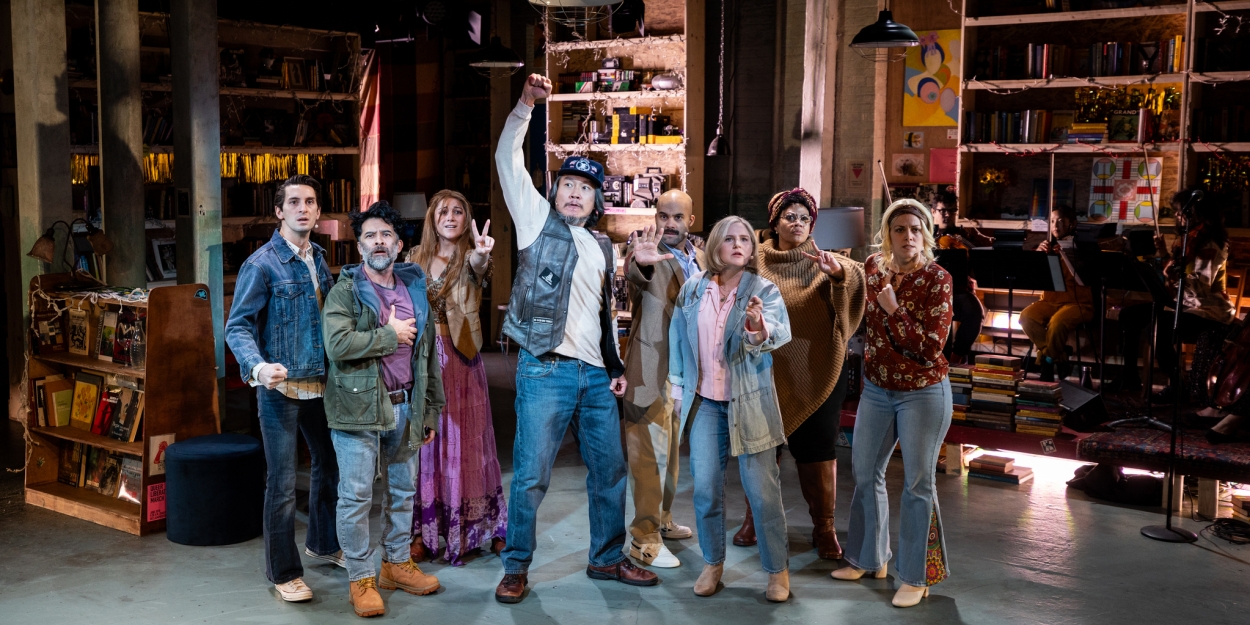Review: Prototype’s EAT THE DOCUMENT Brings Back the Activism of the ‘70s
John Glover-Kelley Rourke’s “Alternative Opera” Couples Idealism and Regrets of Radicals

The lobby of the HERE Theatre in SoHo was buzzing after Saturday’s performance of the new opera EAT THE DOCUMENT--not just for the interesting performance we’d just watched but for the memories of the age that the piece evoked for many in the audience.
Based on the novel of the same name by Dana Spiotta, DOCUMENT is a story of the ‘70s underground, with its activism, and a tale of sacrifice and living a secret. This world premiere piece that started the year’s PROTOTYPE Festival tells what happens 20 years on when “the chickens come home to roost” for a pair of Vietnam era radicals--“passionate, idealistic, and in love,” as the program notes tell us, after they’ve had enough of peaceful protests but go a step too far in the other direction.
The work by composer John Glover and librettist Kelley Rourke, directed by Kristin Marting with musical director Mila Henry starts in 1972, when the unthinkable happens (“It wasn’t supposed to go down that way,” they lovers sing, after, as we find out later, someone is accidentally killed).
Their lives are forever changed: They need to change who they are, recreating their histories as well as their presents, exploring connections in language use, technology music and activism. The pair discover they’ve run out of options and, yes, run out of lies, as they find that the past doesn’t necessarily stay in the past.
Not having read the novel that the opera is based on, I can’t give specifics about which aspects of it were left out or cast aside. But I know from an interview with Rourke that many things have shifted, from song cues to cuts in the story that were needed to make room for the music.
She told me that a particular challenge--and attraction--for the collaborators were characters in the original who were obsessed with popular music that formed a big part of how they saw themselves, including some cult classics of the time. The challenge was how to deal with this, since they were not interested in simply licensing the originals.
The solution for Glover and Rourke was to create some “not-quite-pop songs,” as Rourke put it for me, referring it as “diegetic music.” (This music happens within the created world of the story, or told by a narrator commenting on the story or on his former self to help fill out the characters.) The result in the opera is not totally outside the language that the composer created for the rest of the work, but brings a different kind of energy to it—an appealing, charming energy as it turns out.
The story jumps around from the ‘70s to the ‘90s and later, then back again, from different versions of the main characters at different times in their lives--what changed and what didn’t.
The worlds of the characters as created by the scenic design and props of Peiyi Wong and Oscar Escobedo, with Ayumu “Poe” Saegusa’s lighting and Rashidah Nelson’s costumes, plus Glover’s score were powerful elements in bringing the story to life.
He covered almost every kind of music you can think of, from songs that channel the energy of The Beach Boys (without actually quoting them), to waltzes, to sharp dissonance, choral chants and rock. Besides bringing out the musical obsessions of the characters and how they saw themselves, the collaborators worked well in creating more general music that “simply” moved the story along.
Music director Mila Henry on the piano and her band of a half dozen instrumentalists couldn’t have been bettered in making a strong case for the score.
The cast, combining operatic and music-theatre voices, did well in putting the characters across, under Kristin Marting’s direction, helping them differentiate the multiple roles they played. As the young versions of radicals Bobby Desoto and Mary Whittaker, Tim Russell and Danielle Buonaiuto brought fine voices and good acting to their roles, as they try to figure out their futures. (Russell also did excellent work as Jason, the son of Mary/Louise, accusing her of murder.) The middle-aged versions of the characters were a little less well-delineated but Paul Pinto and particularly Amy Justman (who had more to do) did wonders in filling out the parts of the characters (now, names changed to Nash and Louise).
Michael Kuhn, as a computer “hacktivist” who goes corporate, and Paul Chwe MinChul An, as a Vietnam vet, excelled at every turn, as did Adrienne Danrich and Natalie Trumm, filling out the octet of performers in the piece.
My only quibble was with the ending, which seemed a little less dramatic than it needed to be. Yet the overall work otherwise did a first-rate job in bringing us into a timeframe that seems simultaneously familiar and a world away from us.
Photo credit: Maria Baranova
For more information on the remaining performances in PROTOTYPE, including EAT THE DOCUMENT, please see the website.
Reader Reviews
Videos

